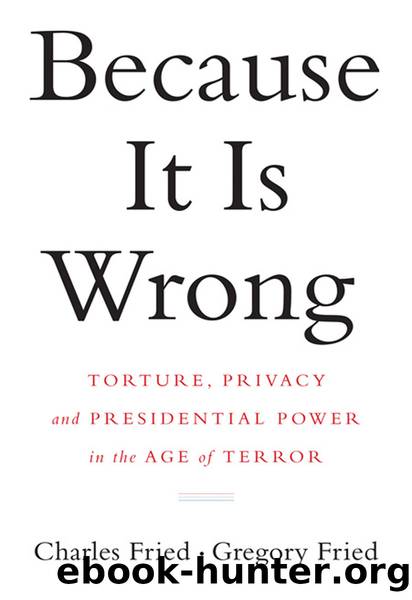Because It Is Wrong by Charles Fried

Author:Charles Fried
Language: eng
Format: epub
Publisher: W. W. Norton & Company
Published: 2010-10-14T16:00:00+00:00
To state the question more directly, are all the laws but one to go unexecuted and the Government itself go to pieces lest that one be violated? Even in such a case would not the official oath be broken if the Government should be overthrown, when it was believed that disregarding the single law would tend to preserve it? 3
Lincolnâs claim was that necessity might force him to break one law (taking it upon himself to suspend habeas corpus) to save the body of laws as a whole. Indeed Lincoln was quite muscular in his assertion of executive authority. When Chief Justice Roger B. Taney ordered that John Merryman, an accused saboteur held in Fort McHenry, be produced before him in Baltimore, the general in charge of the fort not only refused but barred entry to the fort by the United States marshal sent by Taney.4 Lincoln had done his duty as he saw it; now Congress must do its duty and decide if he had acted rightly in an emergency. Recognizing the crisis that Lincoln faced, one that demanded urgent and efficient action, Congress ratified Lincolnâs acts, allowing the raising of troops and the suspension of habeas corpus. Five years later, in 1866, after the war was over and Lincoln dead, the Supreme Court held in Ex Parte Milligan that not only was Lincoln wrong to suspend the writâonly Congress could do thatâbut Congress could not later make Lincolnâs unlawful suspension right. As to the claim that the desperate urgency of the moment gave Lincoln the right to act, Justice Davis, writing for the Court, thundered that such a âperniciousâ doctrine would lead âdirectly to anarchy or despotism.â5 Nevertheless, Justice Davis was also strikingly sympathetic to Lincolnâs urgent need to act during the âlate wicked rebellion,â yet now that âpublic safety is assured,â those illegally detained must be allowed redress for the wrong they had suffered, a wrong that Congressâs ratification could not make right.
There were precedents for what Lincoln did in acting in an emergency before he could get Congressâs assent. In 1807, the United States was still a very young nation, its Constitution only twenty years old. Great Britain, the former master and global power, considered its loss at Yorktown but a transient setback, and had chosen not to accept fully the independence of its former colonies. A sign of this attitude was that British warships claimed the prerogative to board American vessels and press into service any seaman deemed to be a British subject. Americans were increasingly angered and alarmed at violations of their nationâs sovereignty and their citizensâ rights. Then, in what was to become a famous diplomatic imbroglio, the British warship Leopard confronted the American frigate Chesapeake on June 22, 1807, and demanded permission to board in search of deserters.6 When the captain of the Chesapeake refused, the Leopard attacked, crippling the Chesapeake and carrying off four crewmen, one of whom was later hanged for desertion.
The public reaction in America was swift and furious. Citizens in Norfolk, the home port of the Chesapeake, ran riot and destroyed British stores.
Download
This site does not store any files on its server. We only index and link to content provided by other sites. Please contact the content providers to delete copyright contents if any and email us, we'll remove relevant links or contents immediately.
Pioneering Portfolio Management by David F. Swensen(5606)
Rich Dad Poor Dad by Robert T. Kiyosaki(5149)
How To Win Friends and Influence People by Dale Carnegie(3771)
The Money Culture by Michael Lewis(3284)
The Dhandho Investor by Mohnish Pabrai(3168)
The Wisdom of Finance by Mihir Desai(3078)
Liar's Poker by Michael Lewis(2811)
The Intelligent Investor by Benjamin Graham Jason Zweig(2596)
The ONE Thing by Gary Keller(2519)
Mastering Bitcoin: Programming the Open Blockchain by Andreas M. Antonopoulos(2511)
Investing For Dummies by Eric Tyson(2470)
How to Day Trade for a Living: Tools, Tactics, Money Management, Discipline and Trading Psychology by Andrew Aziz(2445)
How to Win Friends and Influence People by Dale Carnegie(2435)
Rich Dad Poor Dad: What The Rich Teach Their Kids About Money - That The Poor And Middle Class Do Not! by Robert T. Kiyosaki(2434)
Fooled by Randomness: The Hidden Role of Chance in Life and in the Markets by Nassim Nicholas Taleb(2413)
Zero Hour by Harry S. Dent Jr. & Andrew Pancholi(2246)
Market Wizards by Jack D. Schwager(2163)
Rich Dad's Guide to Investing by Robert T. Kiyosaki(2111)
How to Pay Zero Taxes, 2018 by Jeff A. Schnepper(2099)
